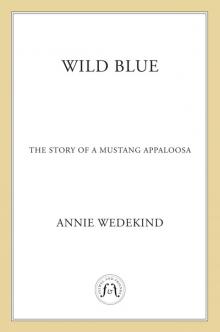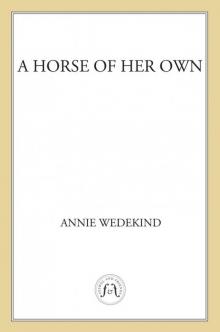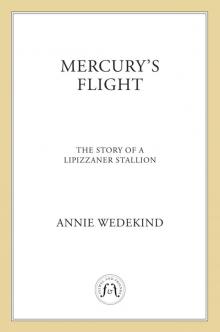- Home
- Annie Wedekind
Mercury's Flight - The Story of a Lipizzaner Stallion Page 2
Mercury's Flight - The Story of a Lipizzaner Stallion Read online
Page 2
I stopped listening. They judge us. I suddenly felt very cold, stunned like a bird who has fallen into a drift of snow. They judge us. I had been judged once and found wanting. If my own mother wouldn’t keep me, why would the men from Vienna? What were we being judged for? And again, the great question echoed in my mind: What is our purpose with men?
“What are they looking for?” I managed to ask.
Ned snorted. “The best, obviously. You know, the horses that are the best. But don’t worry—you and I are definitely going up.” He nonchalantly bent his head to graze.
It occurred to me that Ned had no more idea of what the men wanted than I did, but what he had was total confidence that whatever it was, he had it, and in spades. That his confidence extended to me was comforting, though I think Ned sometimes forgot that we were not actually brothers. It was nice of him—but I never forgot. It was obvious to me that I was different. That I was missing pieces, or that my pieces looked a little different from the other horses’. Ned was whole, and I was still putting myself together. More than any of the other colts, I looked to the men to help me understand the world and my place in it. What would happen if they, like my mother, did not want me anymore?
* * *
Ned told me not to worry about the inspection, and he set a very good example. But I couldn’t help it. I was suddenly aware of the impermanence of my world—not because the stately confines of Piber would change, but because I would be put to a test. I would pass or I would fail, without, perhaps, ever knowing why. Die Spanische itself I didn’t bother with. While I could endlessly contemplate the view from my favorite summer meadow, I did not spare much thought for the unknown. At the moment, I knew that Piber and the school were linked, were a sort of field that I would continue to graze if I was deemed worthy. I wanted to belong to this continuum, even in Vienna, or wherever. I knew that these things must be bound up in who we were, why we were here, and the continuing mystery of what the men intended. To be cut off from the other Lipizzaners, and from the men who cared for us and taught us, seemed unbearable. I was a part of something. I did not want to be cast off.
So, senior in our herd of young stallions, Ned and I luxuriated in the summer mountain fields. But I felt like I always had one ear cocked toward autumn—and change. We were changing. My stubborn dark coat aside, I could feel other, deeper changes in my body. My legs, trotting and bouncing me along the rock-strewn slopes, were stronger, and my stride somehow springier. I took great delight in my legs and liked to trot up and down my favorite meadow, jumping rocks and the narrow, trickling streams that ran in ribbons down the hillsides. One two three four … jog to Ned and touch noses … One two three four … over to the yellow flowers and up, up to the sweet grass … one two three four … bounce! Over the stream and bounce! Another jump for the fun of it … hop! Ned always tried to get me to chase him, to race like the other colts. There was nothing he loved more than running flat out, full speed, in a high-spirited game of tag. But I wasn’t very fast, despite my longish legs, and the colts played too rough for me. When Ned and the others wanted to tussle, I retired to the shade to graze and to contemplate the blue Styrian skies, wondering what changes the change of season would bring.
* * *
When the mountain air cooled and the leaves began to change colors, the herds were collected from the summer fields and brought back to the warmth and structure of the barns, the frequent handling of men, and the routines we had learned to expect with the change of weather. It was a bit difficult for me. I’ve never liked change—most horses don’t—but I in particular, with my slower nature, was grumpy until, after a few days, I grew philosophical.
Of course, the benefit of the barns was that I could resume my study of our handlers, whom we saw in the summer, but not with the frequency and intimacy that our fall and winter quarters provided. I greeted Jan with enthusiasm, and the doctor and stable boys who cleaned our stalls. I was thoroughly and luxuriously groomed and led about and petted and exercised in hand. My legs were admired, and that gave me a great deal of pleasure. We still got to socialize in the covered arena, and I complacently trotted around Ned and the quieter colts while the noisy ones resumed their summer antics, some lower-ranked horses hoping that the change in locale might bring a change in their herd position. I still saw no benefit in the constant jockeying and maneuvering. I took whatever friends came my way and ignored the rest. I was never lonely, and I was never punished for cheek. No horses seemed to actively dislike me, and they all had been schooled early on by Ned to leave me alone when I wanted it. I was different, but I was still a member of the family.
There was a bustle one morning in the courtyard outside the stables, the growling of cars and then the slamming of doors and men’s voices calling out to one another. I poked my head out of my stall to see what was happening. A group of strange men were standing in the driveway, talking with Jan and our other handlers. I watched them curiously, taking especial note of a well-built, solemn-faced person with a quiet way of standing, a little separate from the group. He had a pleasant voice, and I enjoyed watching his movements. After a few minutes of conversation, I realized that though his face was stern, his eyes held warmth. As the men approached the barn, he took a position in the back of the group, much as I might have done.
I swear that it didn’t occur to me until the visitors had made their way halfway down the aisle of the barn, leading out some horses, patting others, passing by some stalls with no comment, that the day of the dreaded inspection had arrived. That this was it. It had been such an absolutely ordinary morning, and with my sensitivity to Jan and the others I thought I would have noticed any tension or excitement they were feeling. Of course, what I couldn’t know was that the decision, for all intents and purposes, had already been made. Or was being made during every day of the three and a half years I’d been alive.
So far, two horses had been led to a paddock outside, one of whom was Ned. Obviously, the paddock was the place to be. I briefly considered whinnying to Ned, but decided to keep quiet. It couldn’t be wise to raise an unseemly ruckus with the visitors so close to my stall. And finally, the soft tapping of the heels of their boots grew nearer, their voices swelled, then quieted, and four faces, wearing varying expressions, were peering in the window of my stall.
I stood very still, ears forward, head cocked so I could see them clearly. Jan’s dear face had a hint of a smile; the stable boy who accompanied them smelled of nerves. One of the visitors, the man obviously in authority, looked cross. And the one I thought I liked—perhaps recognized?—remained in the background, with a thoughtful air about him.
“He hasn’t gotten any better looking, has he?” the leader grumbled.
“I suppose I’m used to him, so he looks as he should to me,” was Jan’s mild reply.
“He’s as brown as the day he was born.”
“He does everything in his own time, Herr Director. In fact—” But the man in charge, the “Director,” cut him off.
“Well, let’s see him, anyway.”
My relief was so strong, but collided so sharply with the surprise of hearing that I wasn’t good looking, that it took me a moment to gather my wits. The Director snorted as Jan encouraged me forward, and, rather dazed, I stepped gingerly out from my stall.
“Come, Schnecki, come, old fellow.” At least I had Jan’s comforting figure beside me as we walked out into the soft, gray October morning.
I was handed over to a groom and led into the paddock, where Ned and two other stallions were being walked. I was too far from Ned for conversation, so I did my best to steady myself, breathing in the autumn air and catching hints of the men with it. The visitors had been joined by the manager of the stud, a man I knew well from his frequent visits to our fields and barns. I was now almost positive that the quiet visitor had been here before, too, perhaps had watched us playing in the summer meadow.… No matter. Though I still did not know the nature of the test that faced us, I knew I was being aske
d to walk, so walk I would. I focused on the beats of my hoofs and the steady stride of the groom beside me. Just walk, I told myself. That’s all for now.
We walked and trotted and stood, then walked and trotted in the other direction. We walked in circles, backed a few steps. We trotted across the diagonal. I tried to pay strict attention to the groom beside me, to sense his will above and beyond his obvious directions. That was always my strategy when working with men: to try to understand the motivation behind the command. I doubted I would ever grasp their reasons—they were too alien. But I could try to interpret the desires that lay under the chirrup, the pressure of the nose band, the energy emanating from my two-legged guide. The groom, whom I liked, was easy to read. Brisk. Energy, now. Collect. Listen close. Straight, go straight. Stretch out. Match my rhythm. Steady.
Easy, and a good way to stay in the moment, when there was so much going on around me. The Director lit a cigar, Jan cleared his throat, and the quiet man was talking to our manager, too softly for me to hear. A handful of birds flew in a noisy gust from a nearby tree. The church bell rang. A filly was being led from the far barn to the field, and the third horse in the ring—a very prepossessing stallion named Pluto Adrina—catcalled to her, drops flying from his nostrils as he neighed and snickered at her. His groom tugged his lead shank, averting a charge. Ned laughed.
Finally our grooms led us back to the center of the paddock and halted us in a line, facing our judges. At least I assumed that’s who they were. To my mind, we hadn’t done a great deal worthy of judgment, but men were mysterious. Who knew what they saw when they looked at us, eyes narrowed over cigar smoke, or open and gray and curious, or twinkling nicely like Jan’s? Apparently they thought I was ugly. That was something I would have to mull over, back in the barn with Ned.
“Not a big group this year, Alois,” the Director remarked.
“Well, no-o,” Dr. Besel, the head of Piber, murmured, “but talented, I think.”
“I’m not convinced by the last one. What do you call him? Schnecki? We must measure him. He looks too big for the quadrille.”
“He’s fifteen point two, exactly,” Jan said.
“Better hope he’s done growing. That head won’t win any beauty prizes. Awkward, altogether awkward.”
“You must hear me—one moment, please!” Jan’s cry startled me and I threw my head up. He sounded quite pained.
“I think we have heard you,” said the Director. “And I’m still not impressed with the quality of all of this year’s candidates.”
“Pardon me.” This from the quiet visitor, leaning forward toward Jan. “I would like to hear your comments, please.”
Poor Jan was a bit pink and flustered, but his voice steadied as he addressed the others. “Granted, Schnecki is a bit odd looking now, but his legs, and especially his hindquarters, are strong and well-formed—I see no true fault in his conformation. He’s just a colt, after all, and has much growing to do. But it is his personality that is unique, his mind and his understanding—”
“He was an orphan, correct? His dam rejected him?” The Director’s words made me cold inside. This was awful. I stared down at the ground, hoping it would all be over soon.
“It was most inexplicable,” our manager said. “But he did well with his foster mother, Galanta. She’s a wise mare. That’s her natural son, Neapolitano Galanta, on the left. A better-than-fine colt, I believe.”
“Yes, that one is obviously suitable. But his foster brother…”
“His foster brother is one of the most intelligent horses I’ve worked with,” Jan returned. “He’s not quick, but once he understands a thing, it’s his forever. You never have to teach him twice. And his role in the herd—well, it’s remarkable. He is absolutely respected by the others, though he has never fought for rank. I am confident he will work extremely well in close proximity with other horses. Not only that, but he is the finest jumper of the lot—he enjoys it and it comes naturally to him. But really—you have to understand me—it’s his willingness to learn that most impresses me. His attention is positively uncanny.”
“And his spirit?” asked the quiet man. “He seems subdued to me.”
“His spirit is a quiet one,” Jan acknowledged, “and he’s very sensitive. He can get a bit low, I suppose.”
“Then we’ll have to keep him cheerful,” the man said lightly. “Come, Herr Graf. Let’s give him his chance. An intelligent horse is always welcome at Die Spanische, yes?”
And with that one easygoing remark, my new friend secured my place. Everyone relaxed, shook hands, and the visitors made their way back to the automobile. We were led back to our stalls and given our feed, just like any other day. Any other day that changed the course of your life entirely.
CHAPTER 3
Clickety clack, clickety clack, clickety clack.
The sound of the train filled my ears and my very dreams as we sped north, north to Vienna, north to the future.…
Clickety clack clickety clack.
I stuck my nose out the window Jan had opened for me, breathing in the cold, delicious scent of melting snow as well as the harsh soot-smell of this great black horse we rode. I found the train very conducive to thinking and was surprised how much I liked the sensation of motion. We were comfortably housed in large boxcars cushioned with fresh straw, and Jan slept with me at night. It was a cozy way to leave one home for another, and as I leaned out to survey the splendid countryside and the great chasing clouds scouring the sky, I felt hopeful, even eager, for what lay ahead.
That spring, just starting, was particularly lovely. At Piber, our herd was full of spirits, and the air was heady with rising sap and leaf bud, soil relaxing from its frost and fast-rushing streams spilling over their banks. We were often muddy, often wet, almost always happy. And underneath the dirt and water, our coats were changing, lightening toward the freckled white of our mothers and fathers. Well, all except mine. I suppose it should come as no surprise that I was taking longer than the others to shed my dark cloak. I was still absolutely, solidly brown, and Ned teased that if he didn’t know better, he’d say I was the son of a draft horse.
I’ve said before that I let Ned do the thinking about what lay ahead, but at the moment, Ned was in a forward car, quite out of hearing, so I let the wind breeze through my mane and considered, for myself, all that Vienna might mean for us.
The great city formed part of my thoughts. Another part was occupied with chewing over Jan’s words. I suppose what surprised me most was his assessment of my status in the herd. Did all the other stallions respect me so? That would be funny, considering that I never fought to earn their respect. I always thought it was Ned who secured my position as an independent horse. It was all rather confusing. But I liked that Jan mentioned my jumping. I hoped I’d have more streams to cross, more logs to leap, once we reached Die Spanische.
But as our journey continued and I watched the thickly wooded hills and neat farms give way to unfamiliar structures, closely packed and laced with roads, I began to wonder what sort of land Vienna was, exactly. Since I knew only Piber, I pictured the capital as another stud farm, on a grander scale. I knew there would be more men, more stallions, and different routines, but I didn’t know that the very earth would be transformed to something made by man. As the clusters of buildings grew ever denser, the train slowed and finally came to a noisy stop in a sort of yard with a bewilderment of tracks, sheds, and men moving over the barren landscape. I ventured to call to Ned and was reassured to hear his eager neigh in return.
We’re here!
* * *
It was good that I’d had so many quiet hours on the train for contemplation, for as soon as I set hoof on the rail yard of the Südbahnhof, things seemed to happen very quickly. The sheer number of men—and their vehicles—was breathtaking. The moment I turned my head in response to one horn, shout, or whistle, another sound would catch my attention. Anchoring me to the bustling scene were Jan, calmly running his hands down my leg
s and affixing my lead rope, and Ned, prancing at his groom’s side, eyes bright with excitement. Next to them, my abbreviated herd, I felt quite ready for anything.
Except, perhaps, to say good-bye. If I hadn’t been so distracted by the clang and din of the world around me, I might have been more prepared for the moment when Jan handed my lead rope over to a dark-haired groom, neat in a gray uniform and cap, and gave my neck a final caress. Startled, I pulled back from the stranger and looked in distress to Jan. But he only smiled and said calmly, “Off you go, Schnecki, old man. You’re going to your proper home. Don’t disappoint us.” Then, in a sharper tone to the groom: “Don’t force him. Let him understand you and have time to think.”
“Yes, sir,” said the stranger who now had his hand on my halter. His fingers smelled sweet, and I soon discovered why as he dipped down into his pocket and retrieved a lump of sugar.
“There’s a good fellow,” the groom—hardly more than a boy—told me as I lipped the treat from his rough palm. “What is it you call him again?”
“Schnecki. He might seem a bit thick at first, but he’s the thinkingest horse I ever raised.” Jan laughed, then took my face between his hands and gave me a kiss on both cheeks. The groom smiled, and whispered in my ear, “We’ll get along well, Schnecki. I have a feeling.” And with that, he shook hands with Jan and turned me away. That was my last impression of my friend, his kiss and his laughter, which warmed me as it was so rare. If Jan was confident, so should I be.
Our procession began on the slushy streets of the city. Pluto Adrina led the way, then Ned, then me. I was almost as interested in the young man beside me as I was in the absorbing, hectic street scene through which we walked, and he soon united my interests by narrating our progress through the city.
“We have a thirty-minute-or-so walk ahead of us, old man,” he began. “Perhaps less, but we must go carefully in all this slop. The snow must be much nicer in Styria, eh? Here it just turns gray, and not a nice gray like your brothers, but this dirty color. No fear, we’ll get you cleaned up at the Stallburg.1 Ah, here we come up to the Belvedere Palace and gardens—not looking their best this time of year, but still…”

 Wild Blue - The Story of a Mustang Appaloosa
Wild Blue - The Story of a Mustang Appaloosa Little Prince - The Story of a Shetland Pony
Little Prince - The Story of a Shetland Pony Samirah's Ride
Samirah's Ride A Horse of Her Own
A Horse of Her Own Mercury's Flight - The Story of a Lipizzaner Stallion
Mercury's Flight - The Story of a Lipizzaner Stallion